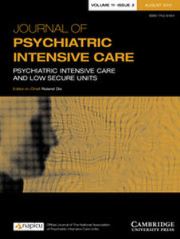Article contents
Management of behavioural emergencies
Published online by Cambridge University Press: 10 April 2007
Abstract
Agitation is a common and serious problem presenting a conflict of values: the need for safety temporarily outweighing the emphasis on dignity, autonomy and privacy that should characterize usual care. Given the difficulty of experimenting with this population, a group of experts in emergency psychiatry met to discuss the management of behavioural emergencies. This was conceptualised as occurring in phases including the first 2 hours, 2–24 hours, and after 24 hours. A number of general principles were recognised, including initial efforts devoted to less coercive strategies that appear as part of a graded hierarchy of choices, awareness of potential organic causes, and an endpoint of calming and patient participation rather than sleep. Anticipation of various contingencies in standard procedures is encouraged. Nonpharmacological methods should always be emphasised. Pharmacological treatment may target symptoms non-specifically in the first phase until the syndrome responsible can be identified and definitive treatment tailored to individual needs in later phases can be started. Benzodiazepines are recommended for their non-specific effects. Second-??generation antipsychotics are preferred for their lower side-effect burden initially and advantages in the domain of hostility as well as relapse prevention. Oral treatment with an orodispersible formulation is preferred to parenteral treatment if possible. Moderate doses of antipsychotics are recommended in contrast to rapid neuroleptisation. Combinations of benzodiazepines and antipsychotics may enhance calming and reduce total antipsychotic dose required for calming but caution is warranted with some agents. Frequent monitoring and reassessment of initial interventions is critical. In later phases, the focus shifts from managing behaviour to treating acute symptoms and finally to education and recovery. The ultimate goal is the return of autonomy, formation of an alliance and development of a durable, mutually agreeable plan of care that considers both tolerability and efficacy in multiple domains. Every effort should be made to prevent undesirable outcomes in the early stages from compromising care in the much longer periods following the behavioural emergency.
Keywords
- Type
- Research Article
- Information
- Copyright
- Copyright © NAPICU 2007
- 7
- Cited by




